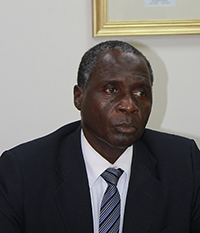“Water for Peace” : this topic, particularly poignant and relevant, highlights the crucial importance of water for peace, cooperation and global stability ...

Mr Abdel Kader Dodo,
Advisor - Project Manager
Sahara and Sahel Observatory
World Water Day 2024 celebrates a particularly poignant and relevant topic: “Water for Peace” that highlights the crucial importance of water for peace, cooperation and global stability.
This Day comes after the 5th Mediterranean Water Forum held in Tunis on February 5-7, 2024 on the theme “Together for shared water sobriety”, and before the 10th World Water Forum due on May 18-24, 2024 in Bali, on “Water for shared prosperity”.
It aims at raising the world public awareness regarding the water shortage exacerbated by the effects of climate change and the immediate need for providing transboundary basins with a sustainable governance framework of their shared resources to meet the water needs of the 2 billion people having no access to drinking water worldwide .
World Water Day 2024 is a true catalyst for numerous projects, programs and initiatives, focused on the promotion of peace through sustainable water management and local and international partnerships aimed at establishing peace thanks to the equitable sharing of water resources, the transboundary in particular. The transboundary nature of water must be considered as a driver for peace, cooperation and prosperity between the populations. According to UN-Water (2023), these resources represent 60% of the planet's fresh water flows, 153 countries are present in at least 1 of the 310 transboundary river and lake basins and 468 transboundary aquifer systems.
Speaking of water, the Sahara and Sahel Observatory (OSS) has given transboundary resources a strategic focus called to play a decisive role in supporting the endless efforts of African countries in the implementation of their sustainable development policies.
Indeed, providing the affected countries with the adequate tools and methods, the OSS contributes to improving knowledge of transboundary aquifer systems within their natural limits, often related to surface waters for better management of their shared resources as well as the sustainability of hydrographic networks and associated ecosystems. Out of the 108 transboundary aquifer systems identified in Africa, only fifteen are documented (UNESCO, 2022).
Beyond improving knowledge, the OSS is developing MoUs for the establishment, by the countries, of frameworks for the management of groundwater in the transboundary aquifers (9 in the world and 6 in Africa out of 468 identified aquifers). More than 3.7 billion people worldwide depend on transboundary water resources. In this regard, the OSS encourages Hydro-diplomacy around the peaceful and joint management of surface and groundwater when these are interconnected.
The positive actions for sustainably developing natural resources of transboundary watersheds have earned the OSS the Vice-Presidency of the African Network of Basin Organizations (ANBO). This includes the design, development and enforcement of multi-risk warning platforms and monitoring of water withdrawals and agricultural land yields (irrigated areas) along with capacity building sessions for an optimal use.
As for the African regions facing water stress or even water shortage, particularly in North Africa (495 m3/inhabitant/year on average), the OSS is promoting high-level dialogue and the exchange of best unconventional water management practices (desalination, demineralization, reuse of treated wastewater). In North Africa where water resources are sparsely renewable, more than 70% are generally used for agriculture, 20% for drinking water and 10% for industrial activities. The development of high added value agricultural practices is therefore pretty much needed.
Thanks to its double accreditation with the Adaptation Fund and the Green Climate Fund, the OSS has been actively committed to supporting the countries to access Climate Finance. The purpose is to secure food security for nations sharing agro-climate areas and regions, and to develop and implement common strategies for climate change adaptation.
March 22, 2024, let it be the day of information, awareness, exchange and sharing of experiences/ proven solutions for peaceful, inclusive and sustainable management of Africa's water resources addressed to the international community as well as to the 10th Session of the World Water Forum.